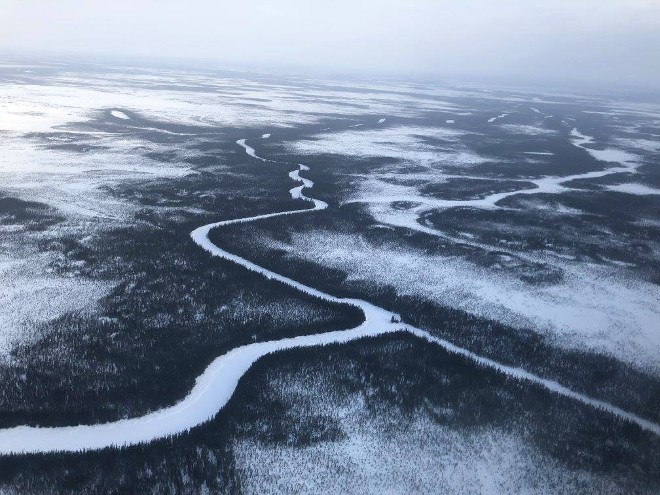A grassroots group has launched a petition in support of Treaty 9 people.
The Friends of the Attawapiskat River petition opposes the proposed Ring of Fire development and a regional assessment in the area. It demands an Indigenous-led process and says it's standing up to Canada to protect people’s inherent and treaty rights, lands and waters.
It is encouraging Treaty 9 people to have a say in the environmental assessment and show support by signing the petition. It will be sent to Canada and Ontario as part of the ongoing consultation process.
Mike Koostachin, who was born and raised in Attawapiskat and is with the Friends of the Attawapiskat River (FAR), said he’s concerned the development will have negative impacts on the environment and health of the land, waters and Indigenous communities.
The proposed Ring of Fire area is situated in the carbon-rich peatlands. The area has deposits of nickel, chromite and other critical minerals used to make electric vehicle batteries.
Attawapiskat is located downstream from the proposed development area.
Koostachin said there’s a concern the peatlands will be destroyed and the mined chromite will flow downstream to Attawapiskat, poisoning the water and causing cancer in people.
“That mine is going to be 120 years old, that’s how (long) that mine is going to be operating,” he said.
In January 2021, Mushkegowuk chiefs called for a moratorium on Ring of Fire development citing similar concerns about the impact on unique wetlands and watersheds.
In April 2021, Attawapiskat, Fort Albany and Neskantaga First Nations declared a moratorium on development in the Ring of Fire.
“It’s just sad how Indigenous peoples are always being integrated with the government. Even though we have inherent rights, treaty rights, Aboriginal rights,” Koostachin said. “That seems like we’re not being listened to.”
The group is also concerned Canada and Ontario are leading the process instead of Indigenous communities. It’s the responsibility of Treaty 9 people to protect their lands, water and future generation from the proposed mining project, reads the group’s website.
Canada and Ontario are discussing a potential agreement on how the regional assessment will be done in the Ring of Fire area.
Public feedback
The Impact Assessment Agency of Canada is currently collecting public feedback on the draft agreement and will be hosting virtual information sessions next week.
People have until Feb. 1 to review the 20-page draft agreement and provide their feedback.
Kerrie Blaise, the northern services counsel with the Canadian Environmental Law Association, said the group asked the agency to extend the Feb. 1 deadline and asked that a minimum 90-day deadline be “set only when it is safe to engage in person, per public health guidelines.”
The agency denied the request saying the 60-day comment period was planned with consideration for the holiday period and the ongoing pandemic-related challenges, according to the email sent from the project manager Dave Bell to Blaise.
Blaise said the group is “shocked” the government is moving forward with the deadline given the ongoing pandemic and public health restrictions.
“Because this is an exclusively Canada and Ontario-led process, they’re the ones calling the shots. Had this been an Indigenous-led process, like so many communities and Indigenous grassroots are asking for, we would be in a different situation,” she said. “We wouldn’t have to be asking for an extension because Indigenous leaders and grassroots would actually be a part of that decision-making process.”
The assessment agency’s spokesperson Jean-Ridel Basigura said the government will be reaching out to FAR regarding the “timing pressures they are facing.”
“The agency is monitoring the situation closely by talking to several Indigenous communities,” Basigura said in an email. “The agency is assessing options with Indigenous communities, the Province of Ontario, and other partners to determine how best to proceed. Agency officials will continue to reach out to Indigenous communities to discuss and notify them of any changes to the current engagement and comment period.”
According to the agency’s tentative schedule, the regional assessment may start as early as March 2022 after the agreement and terms of reference are approved, and committee members are appointed.
“The agency will continue to adjust consultation activities as necessary and provide flexibility to ensure interested groups are engaged meaningfully and safely,” Basigura said.
Blaise said the group is going to continue pushing back on the Feb. 1 deadline.
Monday, Jan. 17, the group is planning to launch a more generic letter that can be signed by allies and settlers in solidarity with the Treaty 9 people.
The government's virtual engagement sessions are on Jan. 17, 18 and 19. Times and links and available here.
Comments on the draft agreement can be submitted online through the Regional Assessment's home page on the Canadian Impact Assessment Registry (reference number 80468).
Participants who wish to provide their input in a different format or schedule an online meeting can contact the agency by emailing [email protected].
